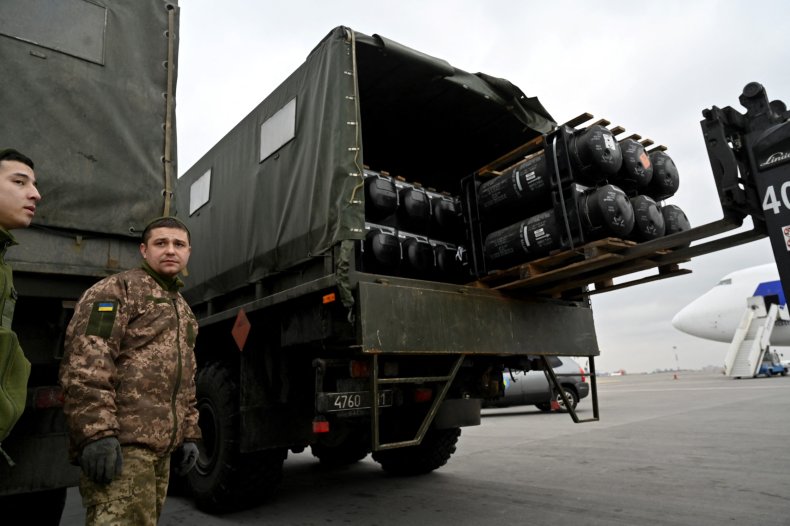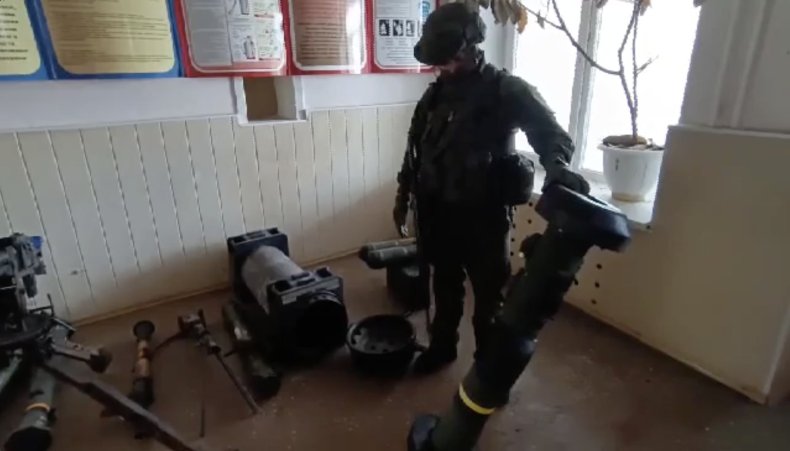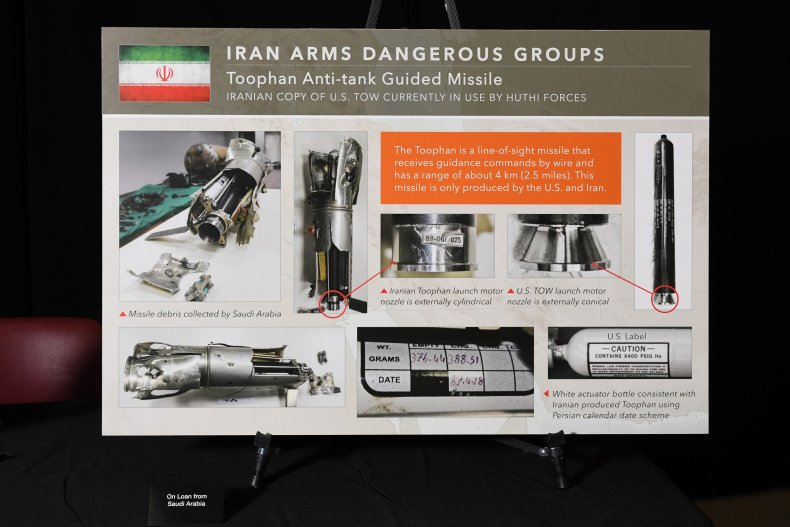A high-ranking Israel Defense Forces (IDF) commander has told Newsweek that Israel is concerned over the risks of weapons provided by the United States and other Western nations to Ukraine ending up in the hands of Israel's foes in the Middle East, including Iran.
With experts too backing these worries, the situation could mark yet another chapter in a long legacy of U.S. arms shipments being diverted, empowering adversaries of both Israel and the U.S. in another restive region, while the focus of Western governments is on the volatile conflict playing out in Eastern Europe.
The Israeli commander, who spoke on condition of anonymity due to the sensitivity of the topic, said the diversion of weapons, such as the Javelin shoulder-fired anti-tank missile system, was being monitored from paramilitary forces operating on both sides of the Russia-Ukraine war.
The Israeli commander said pro-Russian formations were motivated to transfer captured U.S.-supplied weapons due to the close defense relationship between Moscow and Tehran, while pro-Ukrainian elements were largely motivated by money to smuggle arms. The commander said the primary route was via the Black Sea to the Mediterranean, and argued that the situation was "very dangerous" due to two primary concerns for Israel.
"One is that they can research capabilities, and then learn how to manufacture them. I'm talking especially about Iran," the Israeli commander told Newsweek. "The other problem is that we are very worried that some of these capabilities are going to fall to Hezbollah and Hamas' hands."
The Israeli commander said visibility on the exact amount of diversion was difficult to ascertain due to the IDF's traditional focus on monitoring events solely in the Middle East, while the scope of the current flow of arms expanded to Europe and North Africa.
"It's really challenging to build the picture, but we see the signs," the Israeli commander said. "We see the signs, and this is very, very troubling."

Another source, who works in intelligence for a foreign country and also requested anonymity due to the sensitive nature of the subject, identified to Newsweek a specific event on August 20 in which a Russian Il-76 transport aircraft was said to have dropped off a cargo in Tehran worth an estimated $100 million, including Western weapons. The weapons were said to include U.S.-made Javelins and United Kingdom-made Next-Generation Light Anti-armor Weapons (NLAWs).
The source provided satellite imagery to corroborate the information and said the working assessment is that such weapons were being provided for Iran to reverse engineer in exchange for supplying Russia with drones to be used in Ukraine. Newsweek could not independently verify the imagery.
These concerns are emerging at a time of heightened tensions between Israel and Iran, who continue to exchange threats. Israel has also witnessed troubling developments closer to home, as Israeli-Palestinian violence worsened significantly over the past year, with some of the most dramatic clashes erupting over the Hamas-controlled Gaza Strip, while rival exercises have been held by Hezbollah and the IDF on their respective sides of the Lebanon-Israel border.
Newsweek has reached out to Hezbollah, the IDF, the Russian Foreign Ministry and the Ukrainian Foreign Ministry for comment. A representative of Hamas declined Newsweek's request for comment.
Iran's Mission to the United Nations told Newsweek it had "no information" regarding the potential transfer of U.S. equipment from Russia but laid the blame on Washington for fueling the war through the many arms packages sent to Kyiv.
"We feel that with every day this war continues to last, the chance of peace will become more difficult," the Iranian Mission said. "In addition, the lasting damage this war will cause will be severe to the region's people and world peace, at large."
"Therefore, the solution to ending this war is not to sending weapons to Ukraine," the Mission added. "Instead, it is to encourage, facilitate and help both sides sit behind the table and find a solution to ending this war."
U.S. officials have acknowledged concerns about the diversion of weapons supplied by the Pentagon, though they have largely downplayed the risk, asserting that measures being taken by both Washington and Kyiv to prevent the unauthorized flow of arms have been largely successful.
"The U.S. Government remains keenly aware of the risk of possible illicit diversion, and is proactively taking steps to mitigate this risk in close cooperation with the government of Ukraine," a U.S. State Department spokesperson told Newsweek. "We are sending weapons to help Ukraine defend itself in an active conflict, and realistically must acknowledge that there is a risk these weapons could be captured if territory changes hands, as can happens in any war."
"We are closely engaging with the government of Ukraine at the highest levels to ensure accountability of assistance, even amidst Russia's unjust and unprovoked war against Ukraine," the spokesperson added. "Ukraine has committed to securing U.S.-donated equipment and technology and continues to provide extraordinary cooperation and transparency."'
The spokesperson stated that the U.S. "also actively assesses the risk of weapons capture prior to sending systems containing sensitive technology overseas."
As of yet, State Department officials "are unaware of any credible evidence at this point of illicit diversion of U.S. donated advanced conventional weapons by Ukraine," according to the spokesperson. Rather, the spokesperson said, "we see Ukrainians effectively using our security assistance on the battlefield every day to defend their country."
The State Department spokesperson argued that such concerns regarding potential diversion by Ukrainian or pro-Ukraine forces have been amplified by Russia, which was accused of being the likeliest source of arms trafficking.
"Russia continues to push disinformation alleging illicit arms diversion by Ukraine to discredit Kyiv and discourage robust international support to Ukraine," the spokesperson said. "Russia's forces and their proxies capturing weapons on the battlefield poses the greatest risk of diversion that could result in onward trafficking. By starting this war, Russia bears responsibility for any consequences that result from unauthorized re-transfer, including after battlefield capture."
The State Department spokesperson also asserted that the effort "to counter Russia's weapons diversion, including increased training and assistance to better secure weapons and detect and interdict illicit trafficking" was a multilateral endeavor involving both the U.S. and Ukraine along with European partners, and defended Kyiv's record in doing so.
"The government of Ukraine has shown they take the responsibility to safeguard arms seriously," the spokesperson said. "We are confident in the government of Ukraine's commitment to appropriately safeguard and account for transferred defense equipment."
"The Ukrainian government has taken robust action to strengthen monitoring of donated military equipment," the spokesperson added, "including modernizing IT resources, training personnel on more rigorous procedures, and establishing a parliamentary committee to oversee these efforts."
The State Department will "continue to work closely with our Ukrainian government partners to ensure all security assistance continues to be properly used and safeguarded as they defend Ukraine's sovereignty and territorial integrity against Russia's ongoing aggression," according to the spokesperson.
The Pentagon also downplayed the phenomenon.
"As many senior DOD officials have said recently, including in testimony to Congress, we've seen no credible evidence of the illicit diversion of security assistance equipment that was originally destined for Ukraine," a Pentagon spokesperson told Newsweek. "The tangible evidence of this can be seen on the battlefield, as Ukraine continues to use the security assistance provided to great effect in defense of their sovereign territory."

The U.S. has provided nearly $50 billion in military assistance to Ukraine since Russia launched its war in February 2022. Prior to the conflict, the U.S. sent up to 7,700 Javelins to Ukraine and, by two months into the war, had sent an additional 5,500.
More batches of these systems and other portable weapons such as Tube-Launched, Optically Tracked, Wireless-Guided (TOW) anti-tank missiles and Stinger anti-aircraft missiles have continued to come in new aid packages, such as one announced Wednesday, as part of a growing and increasingly advanced array of Western weapons made available to Ukraine.
With arms flooding into the conflict and the presence of paramilitary forces on both sides, analysts specializing on the issue support the assertion that the war in Ukraine has likely led to an uptick in illicit arms transfers outside of the war-torn country, even if it appeared to be limited in nature at this stage.
Among those analysts is Mark Galeotti, founder and CEO of the London-based Mayak Intelligence group. Galeotti, who is also an honorary professor at University College London, co-authored a report last month examining the threat of illicit weapons flows out of Ukraine.
"There is an inevitable bleed of small arms and man-portable weapons," Galeotti told Newsweek. "That said, our evidence so far suggests that this is still on a very limited scale. The real problems begin when the shooting stops."
"Even more sophisticated weapons such as NLAWS and Javelins have gone missing," he added, "and it is reasonable to suggest that potential buyers willing to pay what it takes may be able to acquire them."
Galeotti suspects "that at this stage we are talking about one or two to examine and perhaps reverse-engineer rather than larger consignments," and that, for now, the issue remained one of "long-term risks, especially when the fighting stops, and of small arms and man-portable weapons."
But he warned that now was the time to take action.
"The sheer quantity of under-regulated weapons on both sides of the front line, the prevalence of corruption and transnational organized crime, and the established Black Sea smuggling routes that could quickly be re-established, all suggest that this is a serious potential problem that we should be addressing now," Galeotti said.
The issue channels a long history of U.S. arms inadvertently ending up in the hands of adversarial forces.
This trend was demonstrated most clearly this century in the large quantities of U.S.-supplied weapons wielded by the Islamic State militant group (ISIS) as a result of the mass surrender of U.S.-partnered forces in the face of the jihadis' lightning advances in Iraq and the defeat and absorption of U.S.-backed rebel groups by ISIS in neighboring Syria.
More recently, the Taliban secured a substantial arsenal of U.S. weapons and equipment, including Black Hawk helicopters, after U.S. forces withdrew from Afghanistan in August 2021. The Israeli commander with whom Newsweek spoke said some of the U.S. small arms seized in Afghanistan have already been observed in the hands of Palestinian groups operating in the Gaza Strip.
More broadly, such scenarios are not unique to conflicts across the globe, according to Nils Duquet, director of the Brussels-based Flemish Peace Institute and coordinator of its European Commission-funded Project INSIGHT that focuses on firearm violence in Europe.
"During each armed conflict weapons are diverted, especially small arms and light weapons," Duquet told Newsweek. "This is also the case in Ukraine where weapons have ended up in civilian hands, already in the first days of the current conflict."
Duquet acknowledged the efforts being taken by Western governments to avoid such diversion as it relates to Ukraine, as well as the dearth of knowledge on actual flows occurring around the conflict. But, "given the track record of Iran and the close military ties between Iran and Russia, the risk of reverse engineering of weapons is very present," he argued.

Evidence of Russia providing Iran with U.S.-made weapons captured in Ukraine for the purpose of reverse engineering has previously been attested to by unnamed sources speaking to outlets such as CNN.
The growing defense cooperation between Moscow and Tehran has also been demonstrated in reports of Iran providing Russia with suicide drones such as the Shahed-136 being used in Ukraine, and Russia providing Iran with advanced jets such as the Su-35. A number of drones in the Shahed family have been tied to the reverse-engineering of a U.S. RQ-170 drone that crashed in Iran in 2011 and other Western components.
The White House has alleged that Tehran was now helping Moscow develop such UAVs within Russia. When it comes to lighter weapons, the U.S. has also accused Iran of copying its design for TOW anti-tank missiles to develop the Toophan system, which has been wielded by Hezbollah and fellow "Axis of Resistance" militias in Iraq, Syria and Yemen.
Like Galeotti, Duquet sees the greatest threat looming in the longer-term, where he said there is a "significant risk that conflict legacy weapons from Ukraine will be trafficked and end up in conflict zones and instable countries in the Southern Caucasus or the Middle East, or end up in terrorist and criminal networks."
"Conflict legacy weapons from the war in former Yugoslavia, for example, are still being used in terrorist attacks and in the criminal underworld across Europe, although this war has ended two decades ago," Duquet said. "We can expect a similar scenario with the conflict legacy weapons from Ukraine."
"As a result, a long-term commitment will be needed to mitigate these risks associated with this arms proliferation," he added, "while at the same time taking as many measures as possible already today to limit the risks of future diversion."
Jeff Abramson, a senior fellow at the Washington, D.C.-based Arms Control Association and director of the Forum on the Arms Trade, also acknowledged the Western efforts to mitigate the illicit diversion of arms to Ukraine and the lack of tangible date on this occurring. Nonetheless, he stated with confidence that some of the large quantities of support being given to Ukraine would end up in the wrong hands.
"Given the massive amount of weapons heading into the conflict in Ukraine, there is a near 100-percent certainty that some of those will end up in the hands of third countries that Washington would rather not have them," Abramson told Newsweek. "Highly portable weapons are in many ways the easiest to divert from the conflict, and small arms and light weapons are typically among the most long-lasting and easiest ones to leak from war zones."
Recalling the legacy of how previous wars have served as hotspots for arms trafficking, Abramson said that "it is difficult to believe this conflict will be different than those before it, meaning that we should expect weapons provided to it will end up impacting neighboring regions as they eventually flow out in the coming years, and likely decades."
He noted the potential impact on the Middle East, in particular, saying "these arms certainly could undermine efforts for stability" in that region.
Abramson called for more stringent measures to identify the outward flow of weapons from the Russia-Ukraine war.
"It will be essential that as the war in Ukraine eventually winds down, or stalemates, that efforts be made to clearly identify weapons held by combatants, those that have been used or otherwise expended, and those that may be unaccounted for," Abramson said, "so as to establish strong end use monitoring and work to ensure that as many weapons as possible are not diverted."
This story has been updated to include comment by a foreign intelligence source.








